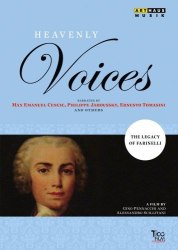|

|
Heavenly Voices - The Legacy of Farinelli
A Film by Gino Pennacchi and Alessandro Scillitani
Narrated by Max Emanuel Cencic, Philippe Jaroussky, Ernesto Tomasini and others.
Also featuring David Daniels, Andreas Scholl, Daniel Behle and many more
Sound Format: PCM Stereo; Picture Format: 16:9; DVD Format: DVD 9, NTSC
Subtitle Languages: Italian, English, German, French, Korean; FSK: 0; Region Code: 0
ARTHAUS MUSIK  101689
[75:00] 101689
[75:00]
This is a rather frustrating DVD. It purports to tell the story of castrati, the rise of whom was largely due to Sixtus V’s banning of women from the stages of the Papal States. Names that now proliferate on disc, Farinelli, Senesino, Caffarelli, Carestini - hardly a month goes by without a tribute CD to one of other of them by leading sopranos and counter-tenors - rose to positions of extraordinary wealth and prestige.
The set-up in the DVD is relatively simple-seeming; leading counter-tenors and musical historians talk about these singers, their repertoire and a little of the composers who wrote for them. Filmed performances throughout put the theory into practice as we watch excerpts from some well-known stage productions - David Daniels in Rinaldo for example - and some that are much less so. Though Cencic, Jaroussky, and Tomasini (a cabaret singer) are the named narrators and the headliners, we hear, in brief interview, from Daniels, Scholl, Daniel Behle and others. Some of the most gripping footage is from older clips of Jochen Kowalski.
So why frustrating? Largely because the fugal interplay of talking heads and performances is too diffuse and unfocused. There is a compulsion to fragment the narrative and to focus on matters unconcerned with the chronologies of historical development. That’s fair enough, in a sense: this is not an academic treatise, though most of the historically informed comment comes from the German musicologist Reiner Moritz and it does add ballast to the argument.
What the film wants very much to convey is the sense of wonderment and astonishment felt by those who heard the great castrati of the eighteenth century. Their rock star status is cemented, naturally, by a video of Jimmy Somerville singing. There’s no doubt that pop singers co-opted falsetto singing in the 1970s and onwards - think of Disco, the Bee Gees, Somerville himself and other prominent stars - though it would be strange to see them in the continuum of development established by the castrati, or even by post-WW2 developments. Jaroussky notes at one point that his generation are fourth-generation counter-tenors, which means one starts with Deller and goes on through say Oberlin to Robson, Kowalski, thence on to Scholl and Daniels and the new breed represented by Jaroussky himself and Cencic. Whether one calls them falsettists, sopranists, mezzo-sopranists, counter-tenors or indeed anything else is a moot point. It depends on their vocal production as much as their perception of themselves.
It’s this aura of self that pervades the second half of the film, a peacock riot of camp in which the transgressive cabaret element is hammered home by Ernesto Tomasini, who was inspired not by Alfred Deller but by another totemic singer, namely Julie Andrews. Tomasini himself was once advised by Michael Chance. He gave Tomasini free singing lessons, to go into opera but he preferred the cabaret arena. A number of clips reveal just how theatrical he and his piano accompanist are; not just the queeny gear but the repertoire.
Some of the most interesting moments however concern the physical. The castrati’s larynx and cords were small, female, or at least childlike, but their bodies grew in some cases enormously. Those grotesque cartoons of puffed up castrati dwarfing their sopranos is actually based in a degree of reality. When Farinelli’s skeleton was dug up it was found that he was about 6 foot 3 - and still growing at the time of death. One of the revealing insights that the singers of today make is that they are trying to ‘preserve’ the boyish element of their voices without cheapening their singing; without, in effect, becoming a travesty of the travesti. Almost all the singing, apart from the cabaret or pop singing is operatic. That in itself locates the main source of the castrato’s inordinate fame. Other films on the counter-tenor - I’m thinking of one that featured Michael Chance and James Bowman - also embrace the song repertoire, where the counter-tenor is equally at home, surely. It’s a shame, speaking of music selection, that this film should have chosen to perpetuate a promo video of Scholl singing the Frost scene from King Arthur - surely one of his worst recordings and not at all reflective of his artistry as a musician. Further, in his defence, he’s about the only singer who mentions song. There’s no consideration of the phenomenon of the counter-tenor in twentieth-century art music either - operatic or song. Maybe this is beyond its brief. As it is there are more than enough conflations and confusions and talking heads for comfort.
We are also treated to a nine-minute film from a studio recording of Leonardo Vinci’s Artaserse. This may or may not grab you, though I was taken by the physical contortions the singers undergo as they project Baroque operatic lines with such defiance and pathos. Overall however, I could have done with a scalpel, revised script, and greater focus.
Jonathan Woolf
 |
 |
|



 All Nimbus reviews
All Nimbus reviews








